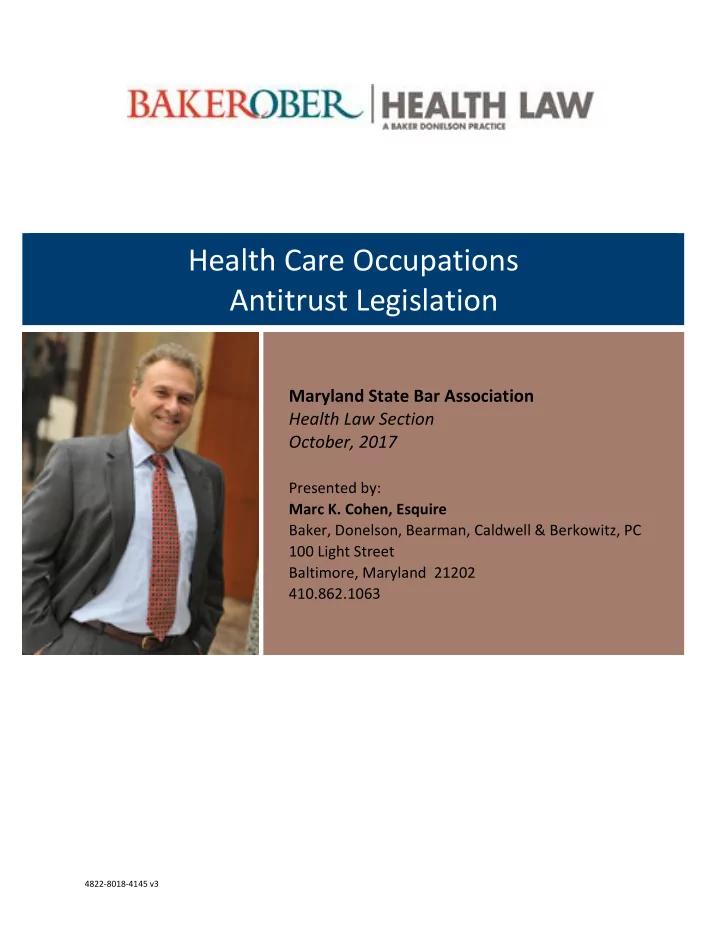

Risk Management Compliance – Informed Consent – Health Care Occupations Antitrust Legislation Maryland State Bar Association Health Law Section October, 2017 Presented by: Marc K. Cohen, Esquire Baker, Donelson, Bearman, Caldwell & Berkowitz, PC 100 Light Street Baltimore, Maryland 21202 410.862.1063 4822-8018-4145 v3
For several years now, the Federal Trade Commission ("FTC") has become increasingly concerned that state professional licensing boards have been making regulatory decisions that help their profession at the expense of competition and free trade. The FTC's concern that professional licensing boards need actual and substantial supervision when issuing orders and regulations restricting professional services by other trades and professions crystalized when it charged the North Carolina Board of Dental Examiners with violating federal antitrust laws after that Board attempted to restrict teeth whitening procedures solely to licensed dentists. In short, the FTC believed that, no matter the level of good faith, licensing boards were too often placing the interests of their profession over the public interest. The FTC asserted that state licensing boards, controlled by their own licensees, were subject to antitrust claims and damages unless their anticompetitive acts were actively supervised by state officials who were not members of that profession. The U.S. Supreme Court agreed with the FTC. In North Carolina Board of Dental Examiners v. Federal Trade Commission (FTC), 135 S. Ct. 1101 (2015) (" NC Dental "), the Court held that licensing and regulatory boards controlled by market participants are only immune from antitrust claims when, to "prevent unreasonable anticompetitive actions," the boards are supervised by state officials, who are not themselves market participants, to ensure their actions are consistent with a clearly articulated state policy. States have been scrambling to enact new laws to ensure their licensing boards comply with antitrust requirements due to this ruling in NC Dental and the subsequent enforcement and policy statements by the FTC. States have taken a variety of approaches in their remedial legislation. In Maryland, the Attorney General, at the request of the legislature, convened a Work Group on Antitrust and Professional Licensing ("Work Group") to develop needed antitrust legislation. The various concepts and proposals developed by the Work Group were considered by the House Health and Government Operations Committee and the Senate Education, Health and Environmental Affairs Committee. Ultimately, the General Assembly passed two companion bills incorporating the Work Group proposals: H.B. 628, Chapter 613 and S.B. 517, Chapter 614. The enacted legislation was intended to ensure that Maryland's professional boards, to the extent they are controlled by market participants, are actively supervised by state officials to ensure that board regulatory actions further a clearly articulated state policy to displace competition do and do not cause an unreasonable anticompetitive burden on commerce. The legislation divided professional boards into two categories. The first category of professional boards were those that licensed all non-healthcare professions. These boards are administratively organized within the Department of Labor, Licensing and Regulation ("DLLR"). Decisions by boards under DLLR are subject to review and approval by the Secretary to prevent any unreasonable anticompetitive actions and that the board decision or action furthers a clearly articulated state policy. DLLR representatives on the Work Group indicated that this was 4822-8018-4145 v3
already the established procedure. Thus, the legislation simply stated this requirement assuring the secretarial review process would continue. The second category of professional boards were those that licensed the health occupation professions. These boards were administratively located in the Department of Health. Work Group representatives indicated that all regulations proposed by health occupation boards had to first be reviewed and approved the Secretary before they could be adopted. Secretarial approval of board regulatory proposals did provide the necessary independent, non-market participant review required by NC Dental and no additional legislation was needed for this type of board action. However, health occupation board licensing and disciplinary actions were never subject to Secretarial review. To provide needed independent state oversight, the legislation required that the Department of Health and the Office of Administrative Hearings ("OAH") develop proposed regulations under which OAH would review board decisions to determine that they further a clearly articulated State policy and prevent any unreasonable anticompetitive licensing or disciplinary actions. Draft proposed regulations ("Draft Regulations") were published by OAH on October 6, 2017. These Draft Regulations appear to be highly limited as to the appeal or review rights of any aggrieved practitioner. First, only a board can even request OAH review. The rights of an aggrieved practitioner asserting an antitrust violation are not addressed. Second, only a board may provide OAH with: a summary of the merits; citations to relevant statutes or regulations; or a summary of the facts of the case. There is no provision for an aggrieved party to respond to or contradict board assertions and submissions. The Draft Regulations, also, only allow a board to supplement a record. The aggrieved party is not provided any right to respond, correct or supplement the record that is reviewed by OAH. These Draft Regulations are now available for public review and comment. It is suggested that all healthcare lawyers active in professional licensing and disciplinary matters carefully review the Draft Regulations and provide comments through the Healthcare Section or directly to the legislature, the Department of Health or OAH. My comments on the Draft Regulations are attached and acknowledge the remedial efforts provided by the Attorney General's Work Group, the authorizing legislation, and the OAH draft regulations. However, the comments also point out the vulnerability to personal liability that remains on the part of all board members and the very limited rights and protections the Draft Regulations afford to the licensed healthcare professional. 4822-8018-4145 v3
Recommend
More recommend